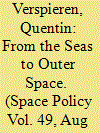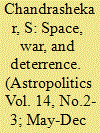|
|
|
Sort Order |
|
|
|
Items / Page
|
|
|
|
|
|
|
| Srl | Item |
| 1 |
ID:
169351


|
|
|
|
|
| Summary/Abstract |
Data collection and information sharing are at the core of any traffic control system. In particular, Maritime Situational Awareness—restricted in this article to one of its main components, the automatic identification system (AIS)—and Space Situational Awareness (SSA) are the backbones of, respectively, maritime and space traffic control frameworks. While the AIS has been initiated by civil authorities for civil purposes and is now being adopted by navies around the world, SSA, originally developed by the military to protect national security assets in outer space is progressively transferred to civil actors. This article shows how and why the intrinsically different nature and history of maritime and space traffics generated a totally reverse approach towards information and responsibility sharing in support to traffic control, while presenting current proposals for the evolution of SSA.
|
|
|
|
|
|
|
|
|
|
|
|
|
|
|
|
| 2 |
ID:
166742


|
|
|
|
|
| Summary/Abstract |
The damaging economic effects of the debt crises on Africa in the late 1980s encouraged considerable research on the determinants of external debt in developing economies. Although sub-Saharan Africa's (SSA) debt was cut by two-thirds by 2008, through two debt relief programmes, debt in the region has since been rising at an increasingly rapid pace. This study provides an empirical analysis of the determinants of external debt in SSA over the period 1960–2016, using dynamic panel methods. It also considers two potentially important factors that have received relatively little attention. One is military spending, rarely considered, despite a number of well-publicised scandals over the procurement of unnecessary and expensive high-tech weapons systems. A second, is the possibility that the countries studied have been involved in conflict. The empirical results point to a positive impact of military spending on external debt, but with some evidence of heterogeneity across the countries. Furthermore, findings indicate that the positive effect of military expenditure on debt becomes more marked in countries that have been affected by conflict. These results imply that policies to improve security and reduce military spending could be beneficial in reducing external debt and, potentially, improving economic performance in the region.
|
|
|
|
|
|
|
|
|
|
|
|
|
|
|
|
| 3 |
ID:
149791


|
|
|
|
|
| Summary/Abstract |
India must accept and deal with the reality that conflicts and wars in today’s world will be driven by the increasing interdependence between conventional, nuclear, and space war. The role of space-based command, control, communications, computers, intelligence, surveillance, and reconnaissance (C4ISR) assets, complemented by other ground- and space-based space situational awareness (SSA) components, is critical for deciding on the new national strategy for waging war and for the deterrence of war. Increasingly, the U.S.-China space dynamic determines the evolution of the global space order. To translate these challenges into an operational capability, India requires, at a minimum, a four-fold increase in capability to launch satellites into various orbits every year. The integration of C4ISR and SSA capabilities into a seamless network that facilitates real-time action is the key organizational and institutional component of the new strategy. More than the technology initiatives, the implementation of this strategy necessitates a clear aspiration on the part of India that it does have an important role to play on the global stage, and that it will carry out the organizational and institutional reforms for defending its national interests and national security.
|
|
|
|
|
|
|
|
|
|
|
|
|
|
|
|
| 4 |
ID:
138401


|
|
|
|
|
| Summary/Abstract |
According to a variety of metrics, business is booming in sub-Saharan Africa. Foreign direct investment (FDI) has increased steadily, from a mere $2.8 billion in 1990 to $57 billion in 2013. Programs that extol both the household and economy-wide benefits of entrepreneurship have proliferated, and a new generation of African business magnates serves as role models for citizens and government officials on a continent that once saw business as anathema to national development priorities. This new capitalist ethos corresponds with other striking achievements. Gross domestic product rose by over 5 percent annually between 2000 and 2014, and growth is forecast to remain in the range of 4-5 percent for the next several years.
|
|
|
|
|
|
|
|
|
|
|
|
|
|
|
|
|
|
|
|
|